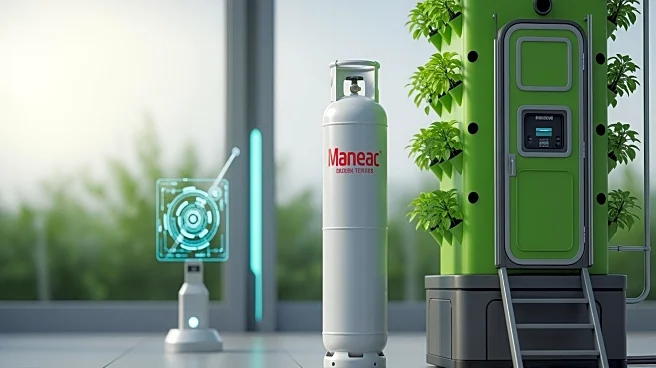What's Happening?
Wildhorse Propane & Appliance is emphasizing the role of propane in enhancing greenhouse and vertical farming operations. Propane is highlighted as a crucial element for controlling growing environments
efficiently, offering reliable temperature control, cost-effective operations, and reduced greenhouse gas emissions. The shift towards vertical farming, which uses significantly less water and land compared to traditional farming methods, is supported by propane's stable pricing and efficient burning properties. This approach is seen as a solution to challenges such as loss of farmland and environmental changes, which affect the agricultural sector, particularly in California.
Why It's Important?
The integration of propane in vertical farming is significant as it addresses the pressing issue of farmland loss and environmental changes impacting agriculture. California, a major agricultural producer, is losing thousands of acres of farmland annually, which threatens local food economies and small farms. Vertical farming, supported by propane, offers a sustainable alternative by increasing crop yields using less land and resources. This innovation is crucial for maintaining food supply and supporting local economies, especially as urbanization continues to encroach on agricultural lands.
What's Next?
The continued support of propane in vertical farming is expected to drive further innovations in agriculture, particularly in California. As small farms adapt to greenhouse and vertical farming methods, they may see increased yields and sustainability. The successful turnaround of vertical farming pioneer AeroFarms from bankruptcy is seen as a positive indicator for the future of this farming method. Wildhorse Propane & Appliance is committed to supporting local farms and agricultural innovations, which could lead to broader adoption of propane-fueled vertical farming across the nation.
Beyond the Headlines
The shift towards vertical farming and the use of propane could have long-term implications for agricultural practices and environmental sustainability. By reducing reliance on traditional farming methods, this approach may contribute to a decrease in pesticide use and water conservation. Additionally, the cleaner burning properties of propane align with efforts to reduce carbon footprints in agriculture, potentially influencing policy and consumer preferences towards more sustainable food production methods.











